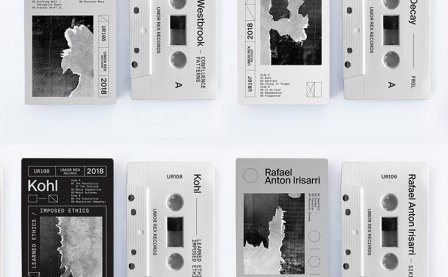Decay and memory loss are common themes in ambient albums, and as 10-year owner of Black Knoll Studios and a multi-instrumentalist who has worked with a crop of modern experimental electronic musicians (ranging from Loscil and Simon Scott to Lawrence English and Pantha Du Prince), Rafael Anton Irisarri is probably well aware of this. A record called A Fragile Geography adorned with hazy black-and-white photography and made in the wake of “political, social, and cultural” tumult brings to mind all number of disintegrations and destroyed baby grands, echoing down the mental caverns without sunshine and so on. But to be honest, this record took me to a different place than those did, a place that mirrored the feelings I imagine a person might get watching everything that matters to them as an artist vanish forever in a few minutes, as Irisarri did when his studio, audio archives, and possessions were stolen on camera back in 2014. Despite its ghostly imagery and ethereal titling, A Fragile Geography strikes me with its immense maximal drones and waves of noise and distortion as a cathartic record, one driven by a furious, nervous energy.
Although I can’t say this record is outright about the robbery Irisarri experienced, this record exists as a corollary to it, and I’d argue the emotional conflicts and states that arose from those events are captured here in its quaking, disconsolate details. This record utilizes maximal minimalism, a kind of drone that elevates somber melodic structures with elements of noise and extreme music. This compositional method is similar to many artists Irisarri has produced or worked for in the past, a kind of modern ambient informed dually by techno and aspects of shoegaze. But where other records of this sort have a tendency to hoist up their production (or extra-textual aspects of the record’s design) as a primary appeal, Irisarri still prioritizes melody over anything else. He uses harsh dynamics to alter the melody’s connotations, suggesting not only progressions that eschew standard ideas of musicality, but a kind of psuedo-personhood within the song; notes stir and swell with anxiety, guided by unseen pressures, a fragile psyche balancing a hundred burdens.
At the beginning, the record sounds dumbstruck — “Displacement” is flat, sad, broken, starting over in the wake of loss. But it goes through a cycle of destructive habits from there, bursting apart like a mad swarm of buzzing bees in “Reprisal” over molten chords. It squeals with train-brake harmonics in “Empire Systems” until it forms a circular THX hymn of aggression, swells like an intrusive thought, like someone in a bad mood caught out in the cold wind, battered by life’s little miseries, temper rising until all that’s left is the aimless intensity and fury of feeling without direction. The cathartic, burning synths employed by Irisarri throughout A Fragile Geography begin life as a faint orchestra and end a twisted mess, aggravated to their utter emotional limits, not their respective technical or melodic extremes (this music is neither sheer noise nor as duly composed as classical music), but rather an exaggerated, engorged version of their initial moods, the tones and particular worries they depicted blown out into all-encompassing monoliths, nepenthean drones by way of sheer distraction — an immense, immediate presence that refuses to be ignored.
Persistent dense loops of sound form aggregate patterns like mental maps: processing thoughts, taking inventory, trying not to lose composure. They last on “Persistence” amid a distant ache of danger and just barely on the nervous “Hiatus,” but they’re unstable and eventually implode under repeated stress waves. Furious white noise consumes “Empire Systems” utterly and transforms the 26-minute bonus EP Unsaid from a smoky reverie into a spectacular collision of steely sound. The consistent loops and cavernous reverb reproach “Secretly Wishing For Rain” as it finds positivity in its second half, dissolving the strings that tempt to bring it out of grey murk.
When compared with previous works, A Fragile Geography shows a much deeper and more profound grasp on both the balance of noise to melodic construction and the sequencing in the larger process of developing an engaging work, generating a mad energy that it sustains over its entire course. It’s a fierce and confrontational work that melds excellent compositions with powerful sonics, creating a malleable emotional core that seethes and burns brightly.
More about: Rafael Anton Irisarri




